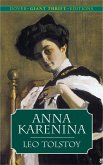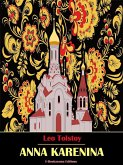In "Anna Karenina," Leo Tolstoy intricately weaves a tapestry of human experience, exploring the tumultuous themes of love, infidelity, and societal constraints within 19th-century Russia. The novel employs a realistic narrative style, marked by its psychological depth and moral complexity, contrasting the protagonist's passionate pursuit of happiness with the rigid societal expectations surrounding her. Tolstoy's masterful characterizations bring to life not only Anna but also a host of figures, from the idealistic Levin to the cynical Karenin, each contributing to the rich social critique enveloping the story. Through elegant prose and vivid imagery, Tolstoy examines the collisions of personal desire with social duty, offering profound insights into the human condition. Leo Tolstoy, an eminent Russian novelist and moral philosopher, drew upon his own experiences and observations of society to create this monumental work. His personal struggles with faith, ethics, and the nature of happiness are evident throughout the narrative, reflecting his belief in the power of love and the consequences of betrayal. Tolstoy's own tumultuous relationships and contemplations of social justice profoundly influenced the themes presented in "Anna Karenina," making it a pivotal exploration of existential thought. For readers captivated by intricate character development and profound ethical dilemmas, "Anna Karenina" stands as a seminal work that invites reflection on the complexities of love and morality. Tolstoy's blend of philosophical inquiry and emotive storytelling cultivates a rich reading experience, making this novel a timeless classic highly recommended for anyone seeking both literary excellence and moral contemplation.
Dieser Download kann aus rechtlichen Gründen nur mit Rechnungsadresse in A, B, BG, CY, CZ, D, DK, EW, E, FIN, F, GR, HR, H, IRL, I, LT, L, LR, M, NL, PL, P, R, S, SLO, SK ausgeliefert werden.









